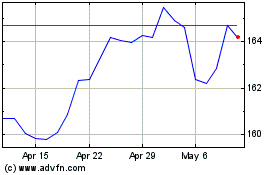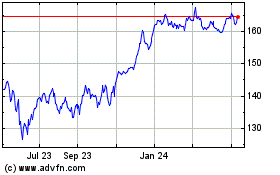Merger Setback Could Crimp SoftBank -- WSJ
April 18 2019 - 3:02AM
Dow Jones News
By Mayumi Negishi
This article is being republished as part of our daily
reproduction of WSJ.com articles that also appeared in the U.S.
print edition of The Wall Street Journal (April 18, 2019).
TOKYO -- Possible delays to Sprint Corp.'s planned merger with
T-Mobile US Inc. threaten Sprint parent SoftBank Group Corp.'s
ambition to invest in the world's most valuable startups.
The merger between Sprint and T-Mobile, announced last year,
would lower SoftBank's large debt by taking taking tens of billions
of dollars in Sprint debt off SoftBank's balance sheet. That would
expand Tokyo-based SoftBank's financing options to fuel an
investment machine that already manages a $100 billion investment
fund and holds a big stake in Uber Technologies Inc.
Shares in the Japanese technology investor slipped 1.5% in Tokyo
trading Wednesday, retreating from a 19-year high the previous day,
after The Wall Street Journal reported that Sprint and T-Mobile's
merger had been challenged by Justice Department staff lawyers, who
expressed concerns that the all-stock deal would threaten
competition.
Reservations voiced by Justice Department staff lawyers aren't
necessarily the last word on a merger, as department leadership
also will have an opportunity to weigh in and make the final
decision.
T-Mobile Chief Executive John Legere tweeted that the premise of
the Journal's story was "simply untrue." Sprint Executive Chairman
Marcelo Claure, who also is SoftBank's chief operating officer,
said in a tweet that he couldn't comment beyond saying that
discussions with U.S. regulators were continuing. A spokesman for
SoftBank in Tokyo declined to comment, referring questions to
Sprint.
SoftBank owns 87% of Sprint and has been weighed down by its
U.S. subsidiary's troubles. Sprint and T-Mobile have said they hope
to close the deal before July.
In a filing with the Federal Communications Commission on
Monday, Sprint said it suffered from a "huge debt load" of $40
billion and cited an analyst's report saying Sprint "could
restructure their balance sheet through a Chapter 11 process" in
U.S. bankruptcy court.
In a note to investors, New Street Research analyst Pierre
Ferragu estimated that Sprint would need a $20 billion capital
injection if the merger doesn't go through.
SoftBank's long-term debt was slightly more than Yen17 trillion
($151 billion) as of Dec. 31, compared with about a third of that
amount in cash and cash equivalents. To help fund its investment
spree, the company in December listed its Japanese mobile unit and
raised about $23 billion. That prompted credit-rating firm S&P
Global Ratings to revise SoftBank's outlook to stable from
negative, while retaining the company's junk, or speculative-grade,
rating.
SoftBank also has flexed its fundraising prowess in Japan, where
most savers get zero interest on bank deposits. Hungry for yield,
retail investors this week rushed to sign up for the company's
latest bond offering, in which it seeks to raise Yen500 billion
($4.5 billion) at a coupon of 1.64%.
A delay in the Sprint deal could complicate further fundraising
and prompt credit-rating firms to take another look at SoftBank's
prospects.
The SoftBank group's finances have been supported by the cash
flow from its Japanese mobile-phone carrier, one of the three major
operators in the country. But that business could be at risk from
Japanese online supermarket operator Rakuten Inc., which plans to
challenge mobile carriers with low-cost services targeting the same
subscribers as SoftBank.
Write to Mayumi Negishi at mayumi.negishi@wsj.com
(END) Dow Jones Newswires
April 18, 2019 02:47 ET (06:47 GMT)
Copyright (c) 2019 Dow Jones & Company, Inc.
T Mobile US (NASDAQ:TMUS)
Historical Stock Chart
From Mar 2024 to Apr 2024

T Mobile US (NASDAQ:TMUS)
Historical Stock Chart
From Apr 2023 to Apr 2024
